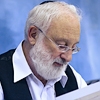Kabbalists About Studying Kabbalah, Part 12
 Dear Friends, please ask questions about these passages from the great Kabbalists. The commentaries in brackets are mine.
Dear Friends, please ask questions about these passages from the great Kabbalists. The commentaries in brackets are mine.
The Opposition of the Study of the Wisdom of Kabbalah
As long as orthodoxy insists on saying, “No! Only Gemarah and Mishnah, no legends, no ethics, no Kabbalah, and no research,” it dwindles itself. All the means it uses to protect itself, without taking the true potion of life, the Light of the Torah in its internals, beyond the tangible and obvious—the revealed in the Torah and Mitzvot—are utterly incapable of leading to its goal in all the generations, and especially in our generation, unless accompanied by expanding the many spiritual roots [in order to achieve the goal].
– Rav Kook, Igrot (Letters), Vol. 2, 232-233
[25162]

 Laitman.com Comments RSS Feed
Laitman.com Comments RSS Feed





Rav,
I am glad you are inviting us to ask on Mishna and Gemarah.
Since I read in Introduction to The Study of the Ten Sefirot that: “a wise disciple, who practices Torah Lishma, should first engage in the wisdom of the Bible, the Mishnah, and the Talmud, as long as his mind can tolerate”, I started reading the Talmud.
Though studying it undoubtedly shed some light upon me, I am seriously questionning — from an intellectual point of view — what are all those rules for. What is the Kabbalistic meaning of all those laws, which can sometimes appear absurd and, other times, contradict from one school to another? Is the purpose of the Talmud only to teach Jews blind obedience toward the Creator, or is it also to invite them to engage in Mitzvot? Finally, are Mishna and Gemarah rules some kind of coded (i.e. Kabbalistic) Mitzvot?
Thank you in anticipation!